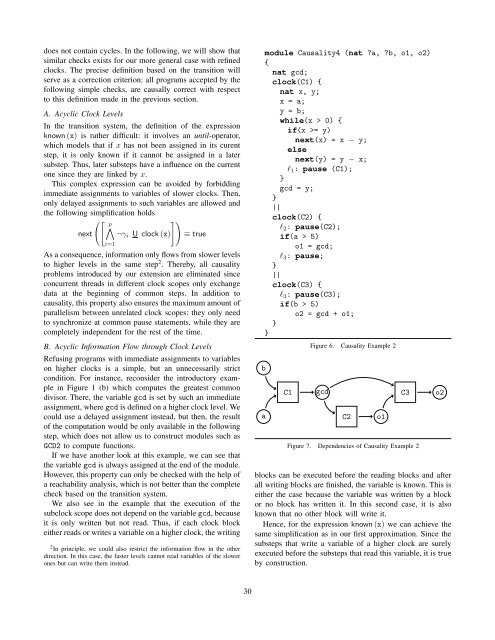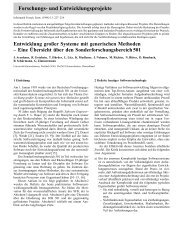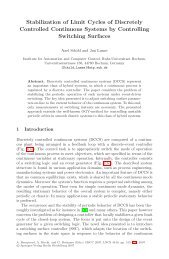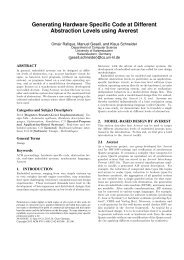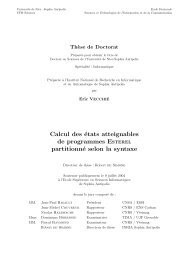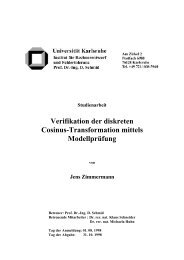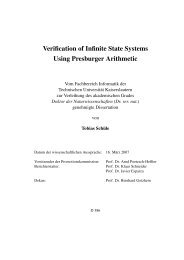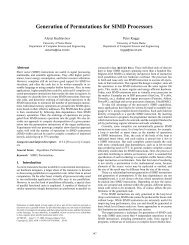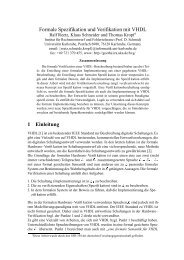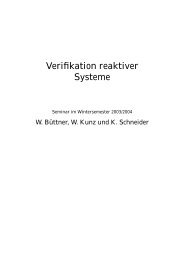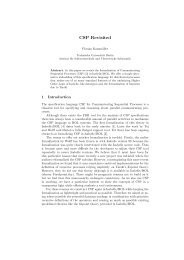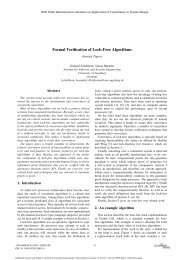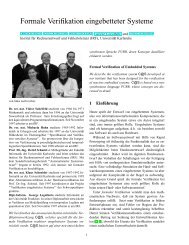Causality Analysis of Synchronous Programs with Refined Clocks
Causality Analysis of Synchronous Programs with Refined Clocks
Causality Analysis of Synchronous Programs with Refined Clocks
Create successful ePaper yourself
Turn your PDF publications into a flip-book with our unique Google optimized e-Paper software.
does not contain cycles. In the following, we will show that<br />
similar checks exists for our more general case <strong>with</strong> refined<br />
clocks. The precise definition based on the transition will<br />
serve as a correction criterion: all programs accepted by the<br />
following simple checks, are causally correct <strong>with</strong> respect<br />
to this definition made in the previous section.<br />
A. Acyclic Clock Levels<br />
In the transition system, the definition <strong>of</strong> the expression<br />
known (x) is rather difficult: it involves an until-operator,<br />
which models that if x has not been assigned in its curent<br />
step, it is only known if it cannot be assigned in a later<br />
substep. Thus, later substeps have a influence on the current<br />
one since they are linked by x.<br />
This complex expression can be avoided by forbidding<br />
immediate assignments to variables <strong>of</strong> slower clocks. Then,<br />
only delayed assignments to such variables are allowed and<br />
the following simplification holds<br />
([ p<br />
])<br />
∧<br />
next ¬γ i U clock (x) ≡ true<br />
i=1<br />
As a consequence, information only flows from slower levels<br />
to higher levels in the same step 2 . Thereby, all causality<br />
problems introduced by our extension are eliminated since<br />
concurrent threads in different clock scopes only exchange<br />
data at the beginning <strong>of</strong> common steps. In addition to<br />
causality, this property also ensures the maximum amount <strong>of</strong><br />
parallelism between unrelated clock scopes: they only need<br />
to synchronize at common pause statements, while they are<br />
completely independent for the rest <strong>of</strong> the time.<br />
B. Acyclic Information Flow through Clock Levels<br />
Refusing programs <strong>with</strong> immediate assignments to variables<br />
on higher clocks is a simple, but an unnecessarily strict<br />
condition. For instance, reconsider the introductory example<br />
in Figure 1 (b) which computes the greatest common<br />
divisor. There, the variable gcd is set by such an immediate<br />
assignment, where gcd is defined on a higher clock level. We<br />
could use a delayed assignment instead, but then, the result<br />
<strong>of</strong> the computation would be only available in the following<br />
step, which does not allow us to construct modules such as<br />
GCD2 to compute functions.<br />
If we have another look at this example, we can see that<br />
the variable gcd is always assigned at the end <strong>of</strong> the module.<br />
However, this property can only be checked <strong>with</strong> the help <strong>of</strong><br />
a reachability analysis, which is not better than the complete<br />
check based on the transition system.<br />
We also see in the example that the execution <strong>of</strong> the<br />
subclock scope does not depend on the variable gcd, because<br />
it is only written but not read. Thus, if each clock block<br />
either reads or writes a variable on a higher clock, the writing<br />
2 In principle, we could also restrict the information flow in the other<br />
direction. In this case, the faster levels cannot read variables <strong>of</strong> the slower<br />
ones but can write them instead.<br />
module <strong>Causality</strong>4 (nat ?a, ?b, o1, o2)<br />
{<br />
nat gcd;<br />
clock(C1) {<br />
nat x, y;<br />
x = a;<br />
y = b;<br />
while(x > 0) {<br />
if(x >= y)<br />
next(x) = x − y;<br />
else<br />
next(y) = y − x;<br />
l 1 : pause (C1);<br />
}<br />
gcd = y;<br />
}<br />
||<br />
clock(C2) {<br />
l 2 : pause(C2);<br />
if(a > 5)<br />
o1 = gcd;<br />
l 3 : pause;<br />
}<br />
||<br />
clock(C3) {<br />
l 3 : pause(C3);<br />
if(b > 5)<br />
o2 = gcd + o1;<br />
}<br />
}<br />
b<br />
a<br />
C1<br />
Figure 6. <strong>Causality</strong> Example 2<br />
gcd<br />
C2<br />
o1<br />
C3<br />
Figure 7. Dependencies <strong>of</strong> <strong>Causality</strong> Example 2<br />
blocks can be executed before the reading blocks and after<br />
all writing blocks are finished, the variable is known. This is<br />
either the case because the variable was written by a block<br />
or no block has written it. In this second case, it is also<br />
known that no other block will write it.<br />
Hence, for the expression known (x) we can achieve the<br />
same simplification as in our first approximation. Since the<br />
substeps that write a variable <strong>of</strong> a higher clock are surely<br />
executed before the substeps that read this variable, it is true<br />
by construction.<br />
o2<br />
30


